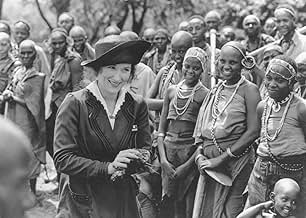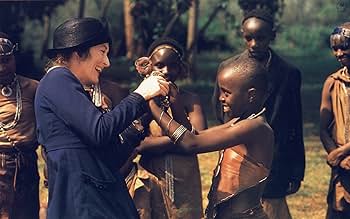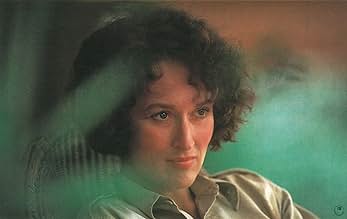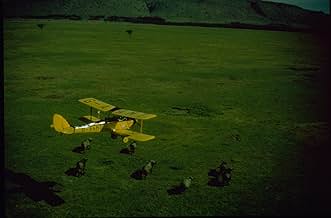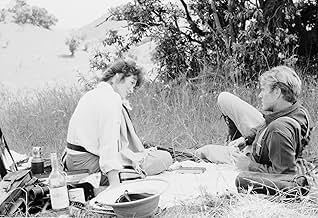Karen Blixen é uma dinamarquesa que vai morar numa plantação de café no Quénia Britânico. Presa a um casamento por conveniência com um marido ausente, irá conhecer Denys Finch Hatton, um ari... Ler tudoKaren Blixen é uma dinamarquesa que vai morar numa plantação de café no Quénia Britânico. Presa a um casamento por conveniência com um marido ausente, irá conhecer Denys Finch Hatton, um aristocrata inglês que se torna o seu grande amor.Karen Blixen é uma dinamarquesa que vai morar numa plantação de café no Quénia Britânico. Presa a um casamento por conveniência com um marido ausente, irá conhecer Denys Finch Hatton, um aristocrata inglês que se torna o seu grande amor.
- Direção
- Roteiristas
- Artistas
- Ganhou 7 Oscars
- 30 vitórias e 31 indicações no total
Avaliações em destaque
While I do understand Phyllida's attempt to have Meryl foreshadow others to show Thatcher's dominance, the movie itself became a one-woman show that barely gave a s*** about the supporting cast. While in Out of Africa, Pollock never resorts to showy camera work to highlight Meryl. The camera moves through the picturesque Africa and the beautiful Meryl so naturally as if the cameraman was lost in the beauty of the entire place. While Meryl is a marvel, Pollock himself is a wise man who gave the picture an independent existence. The Iron Lady will always remain Meryl's Iron Lady.
Based on a true story, Out of Africa shows Karen Blixen's life as she adjusts to the African lifestyle while romancing Denys (Redford) and divorcing Bror (Klaus). The opening itself talks of the farm at the foot of the Ngong Hills and is voiced by Streep in a very distinctive accent. Many of her performances, especially the ones where she uses accents, are slightly difficult to accept first but shine later, even though she does sound like Sly Stallone at times, especially when she says in one scene "I want you to COME HOME". Karen marries Bror to retain her title of baroness and moves to Africa. Bror uses her money against her wishes and doesn't take care of her properly. Karen meets Denys and another guy, and invites them to her home. Both the guys are attracted to her but things go awry for one. Denys and Karen fall in love but Denys lives a very different life, independent like Karen but in a nomadic way. Karen runs the entire farm, opens up a school and acquaints and adjusts herself with the Africans.
Pollack has handled the movie tactfully, and the film is enriched by fine performances. The green verdant lands of Africa with the pastoral huts of the Africans on one hand and the lavishness of the Britishers on the other can be seen. There is this lovely scene where the tribe chief tells Karen that only tall children will go to school. When Karen tells him that sending kids would be very wise of him, the African replies that the Britishers have learned to read, but it has not helped them in any way. Still, the farmers hold respect for Karen's caring nature.
Clocking at 2 hours and 40 minutes, Out of Africa is like a landscape of a beautiful bird on its mighty flight over the flowing rivers and the dense forests. My Rating: 8 out of 10
Meryl Streep stars as Karen Blixen, a Danish woman, who marries Bror Blixen and becomes a Baroness. The couple move to Africa in 1913 and start a coffee plantation.
Blixen cheats on her and is away often for business, while she stays at home working the plantation. Ultimately he gives her VD.
She falls in love with Denys Finch-Hatton (Robert Redford). The relationship is frustrating for her -- Denys does not want a commitment, he wanted freedom. When she returns to her native country, she writes about her experience as Isak Dinesen.
The film shows a lot of interesting history: the class consciousness, for one, as Karen was looked down on because of her humble beginnings. Also, it shows Europeans trying to impose their culture on a foreign people.
It definitely portrays how the different tribes saw the Europeans, basically as people who did not belong there.
It also shows the simplicity of the natives, and how their knowledge of their own country was superior. All of this is before World War II and very interesting.
Interestingly, Sikh Indians are brought to the English Gentlemen's club to act as servants and when Karen dares to enter the men's only den, it's the Sikh who is responsible for escorting her out; none of the English "gentlemen" have the balls or nerve to do it. An interesting observation on the English White man's view of the world before World War I.
Many of the lesser characters were real people. Kumante was apparently consulted by the filmmakers. Felicity is based on aviatrix Beryl Markham.
The cast includes Klaus Maria Brandauer, Michael Kitchen, Michael Gough, and Rachel Kempson, all wonderful actors.
Meryl Streep does a beautiful job as Karen/Isak. Robert Redford is miscast as Denys, who is supposed to be a British aristocrat. If he speaks with an American accent, he can't be a British aristocrat. Apparently Redford used an accent but Sydney Pollack made him overdub his lines; he thought they would distract the audience.
I think he should have been encouraged to work on and use the accent so his portrayal could have closer to the real man. As it is, he comes off as miscast -- and American. He also doesn't register as well as he could, given his looks and charm.
The scenery in this film is the true star. So many of us don't have a strong picture of Africa; this film displays its great beauty.
Interestingly, the story of Isak Dinesen was considered for Greta Garbo, and Audrey Hepburn was offered the role before Streep.
Oscars Best Picture Winners, Ranked
Oscars Best Picture Winners, Ranked
Você sabia?
- CuriosidadesEarly in the film, Baroness Karen Blixen is introduced to her servants. Although the scene is inter-cut with close-ups and other inserts in the film, the first take was filmed as one long shot that required Meryl Streep to meet and exchange dialogue with several other characters. As soon as director Sydney Pollack yelled "Cut", Streep, wearing a high-collared shirt and snug jacket, yelled "get this thing off of me!" and ripped open her jacket. A large beetle had crawled down the front of the jacket moments after the camera rolled, yet she continued filming the scene. Much of it remains in the final film.
- Erros de gravaçãoDuring the lion attack, Denys pulls an additional two spare cartridges from his belt as a ready reload. However, he carries them with his right hand, his trigger hand, which also is the hand needed to break the action to reload. No experienced double-gun hunter would do this. The two reload cartridges must be carried in the left hand, leaving the right hand free to manipulate the rifle.
- Citações
Karen Blixen: It's an odd feeling, farewell. There is such envy in it. Men go off to be tested, for courage. And if we're tested at all, it's for patience, for doing without, for how well we can endure loneliness.
- Cenas durante ou pós-créditosEpilogue: "Karen Blixen published her first stories in 1934 under the name Isak Dinesen. She never returned to Africa."
- Versões alternativasNetwork TV version features additional footage not included in theatrical release.
- ConexõesEdited into A Song of Africa (2000)
- Trilhas sonorasConcerto for clarinet and orchestra in A (K.622)
Written by Wolfgang Amadeus Mozart
Performed by Jack Brymer Clarinet, The Academy of St. Martin-in-the-Fields
Directed by Neville Marriner
Used Courtesy of Philips Classic Productions, The Netherlands
Principais escolhas
- How long is Out of Africa?Fornecido pela Alexa
Detalhes
- Data de lançamento
- País de origem
- Central de atendimento oficial
- Idiomas
- Também conhecido como
- África mía
- Locações de filme
- Empresa de produção
- Consulte mais créditos da empresa na IMDbPro
Bilheteria
- Orçamento
- US$ 31.000.000 (estimativa)
- Faturamento bruto nos EUA e Canadá
- US$ 87.071.205
- Fim de semana de estreia nos EUA e Canadá
- US$ 3.637.290
- 22 de dez. de 1985
- Faturamento bruto mundial
- US$ 227.514.205
- Tempo de duração2 horas 41 minutos
- Cor
- Proporção
- 1.85 : 1



